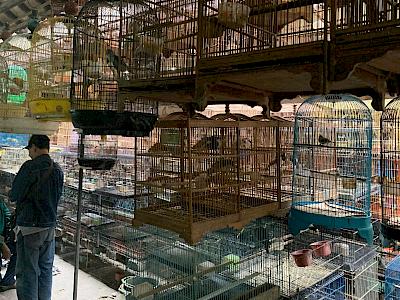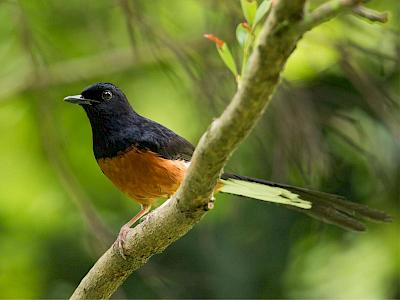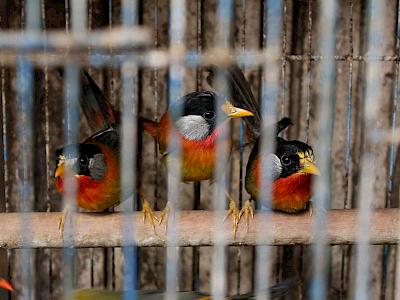
Kanitha Krishnasamy
Director - Southeast Asia
Unravelling shadowy cross-border bird smuggling – Singapore sets an example
There’s a backstory to every pet bird chirping in its cage that few stop to wonder, even as they delight in its song.
For many such birds across South-east Asia, the tale often begins with a bird trap.
From there, a jam-packed plastic crate, a long journey in a dark, suffocating hiding place and – if they make it – a cage in a market or shop.
The saga would have been no different for the birds in a case that recently came to light in Singapore, when the media reported that a pet shop owner linked to a massive cross-border bird smuggling operation had been sentenced to 68 weeks’ jail.
The trader, Leow Seng Lee, who has been in the business for over four decades, was one of three to be convicted for their roles in the smuggling of birds from Malaysia for illegal sale in Singapore.
Wildlife trafficking doesn’t always make the headlines; even less so when the victims are of the feathered kind.
This is the case even though the global bird trade is a multibillion-dollar business and wildlife trade monitoring network TRAFFIC's data shows that at least 459,885 birds have been confiscated from illegal trade in South-east Asia in the past decade.

But, the recent case is significant for several reasons.
First, it highlighted the enormity of the cross-border bird smuggling and its impact on species.
The seizure on March 23, 2023, that led to this prosecution involved 337 birds found in a trailer at the Malaysia-Singapore border – a figure that may not be significant on its own.
Here is where the investigative effort made the difference.
The authorities managed to track eight previous trafficking incidents by the same trio involving 900 more birds.
It tied the network to the smuggling of at least 1,137 birds over a period of about two months and was one of the largest quantities of smuggled birds ever detected.
This put into perspective the magnitude and scale of the trafficking and how well-organised the operation was.
The mortality rate in smuggling attempts is often high, and the March 2023 incident was no exception. More than half the birds died.
The dead included 12 white-rumped shama – Asia’s most favoured songbird and a species severely threatened by trafficking.
How trafficked is it? TRAFFIC’s research shows at least 19,025 of these birds have been seized from illegal trade in South-east Asia since 2014.

The loss is poignant given the joint Singapore-Malaysia effort that recently won greater protection for this bird from illegal and unregulated international commercial trade.
The case also underscored the value of persistence and thorough investigations in rooting out a transnational wildlife trafficking ring with the arrests of the courier, middleman and seller in this network.
Those nabbed were the Malaysian trailer driver who had transported the 10 illegal shipments from Johor, the Singaporean middleman with links to bird suppliers in Malaysia and elsewhere, and Leow, who ran a pet shop and had placed all those orders knowing the birds would be illegally sourced.
The fact that a licensed pet shop owner with considerable experience in the business would use a legal cover to engage in illegal activity should serve as a reminder to the authorities everywhere that no one is above suspicion when it comes to illegal wildlife trade.
Considerable effort was also put into showing how the smuggling had financially and materially benefited Leow, including a price survey and research that showed the sudden access to species he had not been able to import or offer for sale for over a decade.
Vigilance at the border, in-depth investigations and a strong prosecution no doubt contributed to the conviction and jail terms of the traffickers.

Kudos to the National Parks Board, the Immigration and Checkpoints Authority and the public prosecutor on this success.
Though Leow has reportedly closed his bird trading business following the arrest and seizure, this is by no means the end of bird smuggling or trafficking of wildlife across the Malaysia-Singapore border.
TRAFFIC’s data shows at least 2,130 birds have been confiscated in Singapore and 10,553 in Malaysia near their shared border since 2014.
So, monitoring and scrutiny must continue on both sides of the border.
There’s also the matter of the bird suppliers and pick-up points in Malaysia uncovered in this recent case that needs further investigation.
With multiple bird-smuggling attempts detected at the Tuas Checkpoint in this recent case, and a huge seizure of 815 birds from a Malaysia-registered bus at the Woodlands Checkpoint in 2019, there is plenty to warrant closer scrutiny at these locations.
These factors support the argument for more joint enforcement efforts between Singapore and Malaysia to fight cross-border wildlife trafficking.
The same partnership that secured greater protection for songbirds in 2022 also holds the promise of ending these hellish rides across borders for trafficked birds.
Notes:
Kanitha Krishnasamy is director of TRAFFIC in South-east Asia. TRAFFIC is a leading non-governmental organisation working globally on trade in wild animals and plants in the context of both biodiversity conservation and sustainable development, whose mission is to ensure that trade in wild plants and animals is not a threat to the conservation of nature.
About The Straits Times

The Straits Times is a leading news website in Singapore and Asia, covering breaking news, science, business, lifestyle, tech and more.



